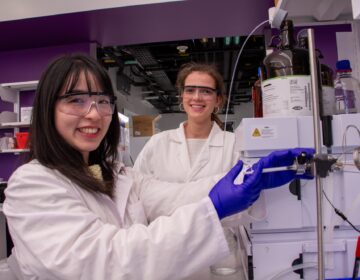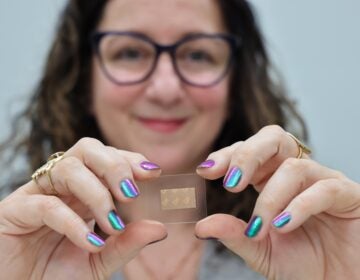This research subject calls himself a ‘professional guinea pig’
Listen
Alex Spencer sits at his table making phone calls to be a test subject for new studies. (Paige Pfleger/WHYY)
Alex Spencer has earned thousands of dollars as a research subject.
“That vein right here on the left side of my left arm has probably made me upwards of $10,000 over the years,” Alex Spencer says as he points to one of his track marks.
Sitting at his kitchen table, Spencer is wearing plaid pants and a T-shirt with strands of DNA printed on it. For the past decade, he’s paid his rent by participating as a healthy volunteer in clinical and scientific research studies for money. He calls himself a professional guinea pig.
“I’ve done all sorts of things,” Spencer says. He’s done smell tests and psychology questionnaires, which might pay anywhere from 20 to 50 bucks. He’s also stayed in hospitals for up to 17 days, under observation with an I.V. in each arm. Something like that earns him thousands of dollars.
“I’ve had biopsies on three or four different parts of my body. I’ve taken ketamine and tripped my mind off for two hours. I’ve had cameras in my rectum while I watched it on a screen,” he recalls.

Alex’s visitor badge and medical bracelet. (Paige Pfleger/WHYY)
Now 38, Spencer says he started this non-traditional career path in search of adventure.
“I was just looking for something more interesting, you know, a good story I could tell my friends. But also, I was working a 10 or less an hour job at Dunkin Donuts, barely making any rent,” he says. And suddenly you hear that you’re going to get four grand for lying around watching TV for a week. Whatever the health risks and whatever else involved, it sounded pretty good.”
In addition to his work volunteering for studies, Spencer is a professional karaoke DJ at night. His stage name is Dr. Thunder.
Some worry about the potential ethical problems involved in paying research subjects. Listen to the full story above, plus a conversation with Christine Grady, an ethicist from the National Institutes of Health.
WHYY is your source for fact-based, in-depth journalism and information. As a nonprofit organization, we rely on financial support from readers like you. Please give today.







